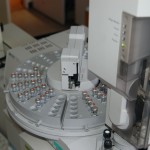From metrological development to exposure and risks evaluation
LERES research projects are most often conducted in partnership (pdf, 306ko) with national and international organizations or companies. They focusse mainly in two areas :
– Water r esources (surface and groundwater) as well as treated water and its priority uses in public health (consumption and water recreation).
esources (surface and groundwater) as well as treated water and its priority uses in public health (consumption and water recreation).
– Indoor environments.
The general thematic is on the one hand metrological development for the knowledge and decision-making, and on the other hand the tools developed in the framework of water and indoor environments sanitary control. The application of tools (methods of analysis and sampling, rapid measurement) focuses on the study of contamination by dangerous anthropogenic (micropollutants) or natural substances (algal toxins), by their by-products (metabolites, transformation products from treatment processes including disinfection for example) or by microbial agents. These studies may be supplemented by exposure studies.
Key matrices are waters (and their colloidal dissolved and particulate fractions), air (and volatiles substances) and dust in the house (inorganic and organic compounds).
Download the list of the publications.
LERES, one of the IRSET’s teams
IRSET (Institute for research in Health, Environment and Work), was created by the University of Rennes 1 and the EHESP in 2009. It is one of the largest national clusters of interdisciplinary research, with an international ambition, and focused on the risks linked to the environment and the work.
Objective
To study and understand the biological processes and environmental factors which influence human health and to help the public authorities concerned make informed decisions based on scientific evidence
IRSET includes the following research teams:
– The endocrinology, reproduction and development group in humans and mammals (Inserm U625, University of Rennes 1 and University of French West Indies and Guiana),
– The Signaling & Stress Response to infectious and chemical agents research unit (University of Rennes 1),
– LERES team (Laboratory for Research and Study in Environment and Health).
These teams also collaborate significantly with the Teaching Hospitals of Rennes and Pointe-à-Pitre.
Research works
They range from the specific hazards identification to exposure measurement.
They also focus on the characterization of effects on humans and animals, on the determination of the contribution of these hazards to the occurrence or increase of various pathologies. On this last point, knowledge on how environmental factors (present in water, air, food, home and/or workplace) impact health, remains very limited.
This multidisciplinary approach requires a strong and unique connection between:
– Pure research,
– Medical research
– Methodological research
– Toxicology
– Epidemiology
– Risk assessment
– Expertise
– And interaction with citizen.
The different IRSET activities, today spread on several university campuses, will be grouped in a new building located on the EHESP site
